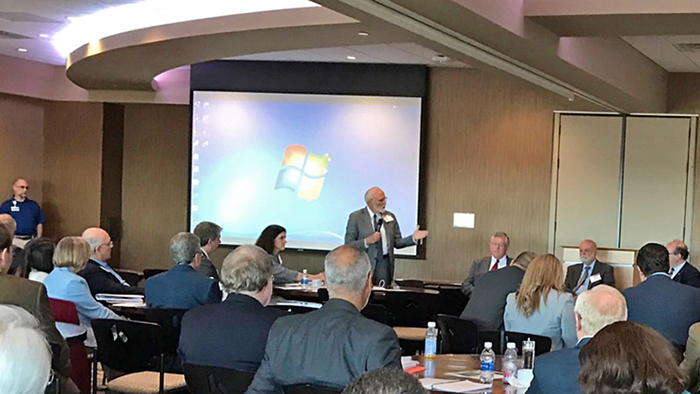More than 2,300 years after Aristotle wrote in The Nicomachean Ethics “…the good has rightly been declared to be that at which all things aim,” people still can’t always agree on what is good.
Loma Linda University Health’s commitment to ethical healthcare and education is guided by its distinctive Christian denomination, the Seventh-day Adventist Church. Sharing this heritage are the four other health systems in the United States also affiliated with the Adventist Church.
Now these five systems are pulling together in a consortium to share bioethics resources and expertise, as well as jointly consider some of today’s most urgent issues of ethics in medicine.
Named the Adventist Bioethics Consortium, the venture is coordinated by Gerald Winslow, PhD, director of Loma Linda University Center for Christian Bioethics.
The other members are Adventist Health System, Kettering Health Network, Adventist Health and Adventist HealthCare. This group comprises some 80 hospitals and 130,000 employees across the United States, making it the second-largest faith-based health system in the country.
“We have rich opportunities for collaboration on bioethical challenges facing this country through the lens of Adventist moral and ethical commitments,” Winslow said.
Bioethics, Loma Linda and Baby Fae
It was a bioethical debate that brought Loma Linda University Health to the forefront of the news cycle in 1984, when pioneer surgeon Leonard Bailey, MD, transplanted a baboon heart into a newborn baby girl who came to be known as Baby Fae, trying to save her life.
That same year Loma Linda University Health established its Center for Christian Bioethics, which had been approved by the Board of Trustees in 1983. Initiated by founding director Jack Provonsha, MD, PhD, the center has given particular attention to the integration of religion, medicine and ethics.
Adventist Bioethics Consortium
The Adventist Bioethics Consortium was inaugurated during the second annual Adventist Bioethics Conference in April, held at Kettering Health Network in Ohio and attended by about 100 representatives of the different systems.
Moving forward with the consortium, the annual Adventist Bioethics Conference will continue. Additionally, the consortium will form interest groups on specific issues such as palliative care for patients who are unable to consent. Other practical helps offered through the consortium will include webinars, self-directed online courses and continuing education seminars (with credit offered by Loma Linda University Health).
The Adventist Bioethics Consortium website, though still in development, offers more information.
Issues in biomedical ethics
Today, key bioethics debates surround topics including physician-assisted suicide, gender dysphoria and stem-cell research.
But for Winslow, the biggest bioethics issue we face comes down to basic human fairness: equal access for all people to quality health care.
“In Christianity,” he said, “the commitment to protect the most vulnerable members of society is not optional. We must find a sustainable way to provide medical care to everyone, especially those who are least likely to get a fair shake.”
Winslow points to the parable of the sheep and the goats in Matthew 25, in which Jesus describes the life well-lived, going beyond Aristotle’s “good” to “righteous.” Jesus said: “Truly, I say to you, as you did it to one of the least of these my brothers, you did it to me.”
Read the full story about the new Adventist Bioethics Consortium at news.llu.edu.

